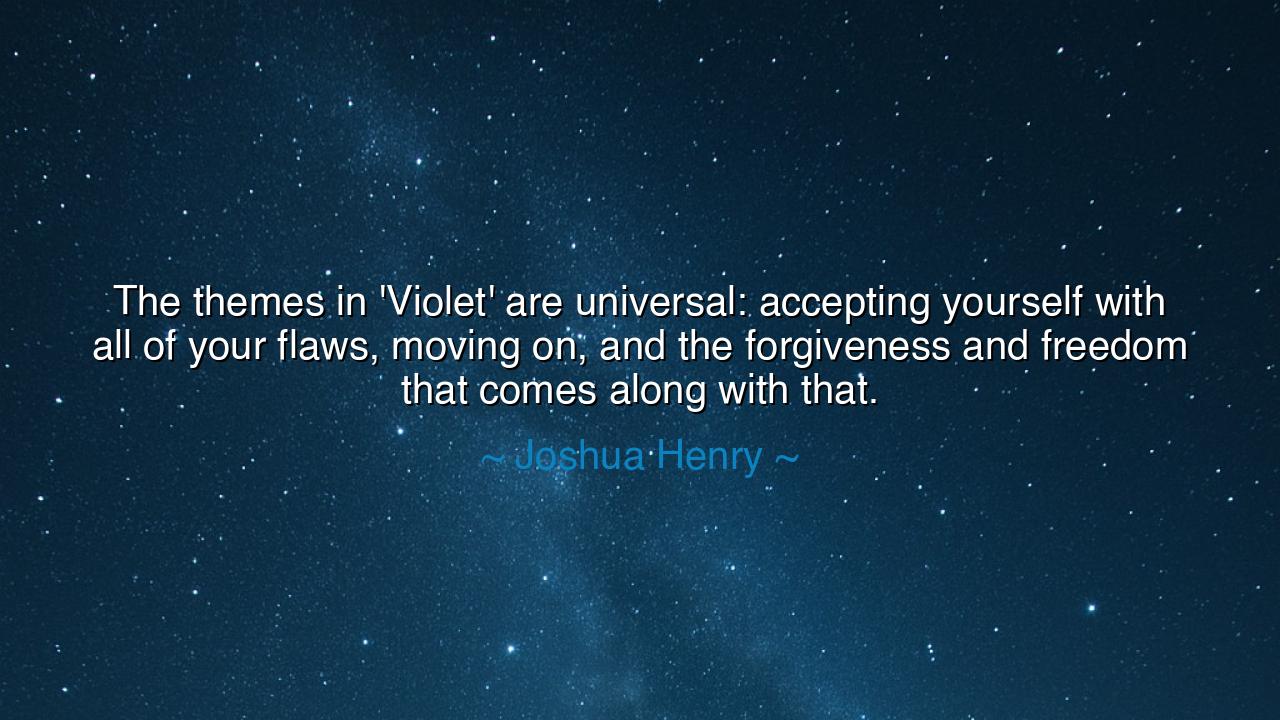
The themes in 'Violet' are universal: accepting yourself with
The themes in 'Violet' are universal: accepting yourself with all of your flaws, moving on, and the forgiveness and freedom that comes along with that.






Hear the voice of the actor and singer, Joshua Henry, who, speaking of art yet touching the heart of all humanity, declared: “The themes in 'Violet' are universal: accepting yourself with all of your flaws, moving on, and the forgiveness and freedom that comes along with that.” These words carry the fragrance of deep truth, for they reveal the eternal struggle of mankind: to reconcile with the self, to rise beyond past wounds, and to taste the freedom that forgiveness alone can give. What he names as the themes of a story are in truth the themes of life itself.
The meaning is this: the first and hardest task of every soul is accepting yourself with all of your flaws. For men and women often live in chains, not bound by the hands of others but by the prison of their own shame. They see scars, mistakes, failures, and they shrink from their reflection. Yet the wise know this: one cannot rise by despising the self. Just as the sculptor accepts the roughness of the stone in order to carve it, so must we accept our imperfections, for they are the raw material of our becoming.
From this acceptance flows the power of moving on. Life is filled with pain—lost dreams, broken loves, bitter regrets. Many cling to these as if they were relics, refusing to let go. But to cling is to bleed forever. The ancients taught that the river flows ever onward, and the one who stands clutching the past is soon swept under. To move on is not to forget, but to carry wisdom forward while leaving behind the poison of grief. In this, Henry names a truth that all generations must hear: moving on is the secret to survival, and beyond survival, to joy.
Then comes the greatest gift: forgiveness and freedom. For even when we have accepted ourselves and released the past, the weight of bitterness may remain. The wrongs done to us, the wrongs we have done to others, sit heavy upon the heart. But forgiveness—whether of ourselves or of those who wounded us—is the key that breaks the final chain. History shows this clearly. When Nelson Mandela walked free after decades of imprisonment, he chose forgiveness rather than vengeance. In so doing, he not only liberated a nation but also himself. Forgiveness gave him the freedom that hatred could never give.
The ancients, too, whispered of this. In the tale of Job, who lost all—his family, his wealth, his health—it was not by bitterness that he found peace, but by holding faith and yielding his heart to a wisdom greater than his own. Though scarred by suffering, he was restored, for he learned the freedom that comes when one accepts the flaws of life and entrusts the future to the divine. His story mirrors what Henry reveals: in every age, the path to peace lies through acceptance, release, and forgiveness.
The lesson for us is luminous: embrace yourself fully, including your brokenness. Refuse to be chained by the wounds of yesterday. Seek forgiveness—not because the past deserves it, but because your soul does. For in forgiveness lies freedom, and in freedom lies joy. Without these steps, we are prisoners of ourselves; with them, we become whole.
Practical action follows. When you wake each day, look upon yourself without hatred. Speak aloud, even quietly, that your flaws do not diminish your worth. When sorrow or regret rises, choose to step forward rather than linger in the ashes. When anger at another burns, breathe deep and loosen it, not for their sake but for your own freedom. Practice these daily, and slowly the chains will break.
For remember this: the journey of the soul is not toward perfection, but toward wholeness. And wholeness is found not in denying flaws, but in embracing them; not in clinging to loss, but in moving beyond it; not in hatred, but in forgiveness. As Henry reminds us, these are the universal themes, not of a play alone, but of all human life. Whoever walks this path will find not only peace, but the radiant strength of freedom.






AAdministratorAdministrator
Welcome, honored guests. Please leave a comment, we will respond soon